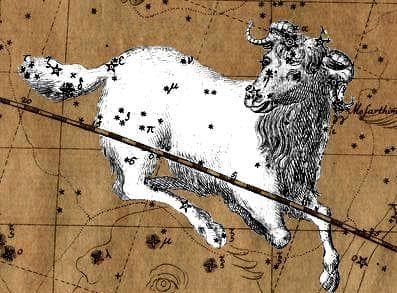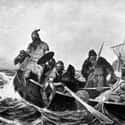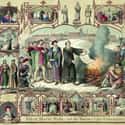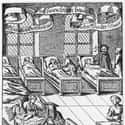-
(#1) It Made Modern-Day Europeans More Susceptible To Certain Diseases
The Black Death made such a significant impact on the population of Europe that it may have literally changed the genetics of the descendants of its survivors.
The implications are both positive and negative. Subsequent encounters with the bacteria responsible for the Black Death - Yersinia pestis - likely went a bit better thanks to the genetic shift (later outbreaks never matched the ferocity of the original). And this may also explain why modern-day Europeans are more susceptible to autoimmune diseases and pro-inflammatory diseases than populations whose ancestors didn't experience the Black Death.
-
(#2) It Gave Rise To The Birth Of The English Pub As We Know It Today
The culture of the English pub can be traced directly back to the Black Death, according to one historian. Professor Robert Tombs from Cambridge University says that wages rose and prices fell following the plague, allowing working people easier access to beer. Pubs sprang up to accommodate the demand, sparking English pub culture.
Brewers could operate full-time thanks to the "greater freedom and prosperity" for the working class in the wake of the Black Death.
-
(#3) It Prevented Vikings From Settling In North America
The history of North America would have looked a whole lot different if the Black Death never happened. Viking settlers in Greenland all but completely died out due to the plague (and attacks by natives), so they were never able to get a foothold on mainland North America and properly settle the place.
Norway was "enfeebled" by the plague, as well, so it couldn't get supplies to the settlements in Greenland founded centuries prior by Erik the Red. Things got so bad that Greenland had to be "rediscovered" in 1585.
-
(#4) It Gave Us The Grim Reaper
Metalheads and Halloween lovers have the Black Death to thank for the popular image of death as a "Grim Reaper." The widespread death and disease changed the visual arts of the time to focus more on death and dying, to a macabre degree. Death became personified in the form of the scythe-toting Grim Reaper, a menacing figure that preyed upon the rich and the poor equally.
The Black Death helped people to realize that death truly is democratic.
-
(#5) It Gave Us The Basis Of Our Current Property Laws
The Black Death killed millions of people and tore families apart, which made it extremely difficult for survivors to figure out inheritances and who exactly owned pieces of property (especially when all the male heirs were wiped out). Family squabbles over such issues lead to litigation on a level unheard of prior to the plague, which lead to further litigation that set precedents in property law that still stand today.
One historian notes that barristers from the time would function just fine in today's courts. Here's Norman Cantor on the matter: “A barrister of 1350 deep frozen and thawed out today would need only a six-month refresher course at a first-rate American law school to practice property or real estate law.”
-
(#6) It Inspired The First Instance Of Biological Warfare
The Black Death allowed one Mongol warrior to use disease as a weapon on the battlefield. Janibeg was a Mongol military commander who inherited the empire left behind by Genghis Khan. In 1346, Janibeg wanted to take over the city of Caffa, a trade port on the Black Sea in Crimea. The Black Death, however, was depleting his ranks and making the prospect of conquering Caffa less and less likely.
Janibeg came up with a thoroughly revolting plan to overcome this setback: he started catapulting his dead soldiers over Caffa's city walls. It worked: the people of Caffa fled to Italy, victims of the first known instance of biological warfare.
-
(#7) It Helped Create A Culture Of Anti-Semitic Intolerance In Europe
Jewish people were blamed by many for the Black Death, especially in Germany. People were desperate for answers, so they created stories about Jewish people poisoning wells to satisfy their need for a scapegoat.
Germans killed Jewish communities in riots called "pogroms" to eliminate the non-existent threat, nurturing a culture of anti-Semitism that ultimately lead to the Holocaust in the 20th century. A study in 2011 showed that villages where Black Death-era pogroms took place were more likely to demonstrate a violent hatred of Jews more than 600 years later.
-
(#8) It Paved The Way For The Theory Of Contagion
The Black Death helped the public at large to realize that "humors" weren't the cause of disease. Because so many people were getting violently ill and dying, the Greek concept of humors - four bodily fluids that controlled an individual's health - started to seem wildly unlikely (how are so many people experiencing this "imbalance" of fluids?).
Instead, the theory of contagion began to be widely accepted, slowly but surely: it wasn't until 1546 that the medical establishment in Europe embraced the theory of contagion. The theory prevailed until Robert Koch's germ theory of the late 1800s.
-
(#9) It Gave Us The Word 'Quarantine'
Quarantine is a common term generally used to mean a period of time when the sick need to stay isolated from the healthy. But where does the term come from? "Quarantine" comes from quarantino, which is derived from the Italian word quaranta, meaning "forty."
During the Black Death, the Italians devised a 40-day isolation period for the sick, likely inspired by biblical events that lasted 40 days (the great flood, Lent, etc.). The concept of isolating the sick pre-dates the Black Death, but the term "quarantine" originates from that time.
-
(#10) It Hastened The Dominance Of The English Language
It would be a stretch to say that we would all still be speaking Latin if it wasn't for the Black Death, but historians do think that the plague hastened the dominance of English. The Black Death killed a "disproportionate number of the clergy," meaning it killed a lot of men who were literate in Latin.
Who replaced them? A lot of laymen barely literate in Latin, who also just so happened to be barely literate in English.
-
(#11) It Helped Create The Middle Class In England
Most people alive in England at the time of the Black Death were peasants. Following the Black Death, there were a whole lot fewer peasants left, meaning they could - in the words of one historian - be a lot more "choosy about where they worked" and more expensive to procure. Those remaining peasants thus accumulated the wealth of those who died and were better off than before, leading ultimately to the rise of the middle class.
The Black Death essentially gave peasants a lot more leverage in how they related to the upper classes.
-
(#12) It Lowered Genetic Diversity In England
England would be a more genetically diverse place if it wasn't for the Black Death. That's right: England was actually more diverse in the 11th century, prior to the plague, than it is today. "Random genetic drift" is partially to blame, but population crashes like those that occurred after the Black Death are likely the main cause.
One theory to help explain it is that England didn't quarantine the sick like the Italians did (for just one example), leading to less variable DNA sequences for the English.
-
(#13) It Sparked The Protestant Reformation
The Black Death is widely considered to have struck a blow against religion, considering how the clergy was just as susceptible as anyone else to the disease (royalty was similarly impacted; Princess Joan of England - daughter of Edward III - was a victim). Clergymen killed by the plague were often replaced by less-experienced and sometimes corrupt men, which further helped to weaken the Catholic Church's image.
The "Great Schism" of the Church in the 14th century that ultimately lead to the Protestant Reformation was aided by the Black Death and the chaos that followed.
-
(#14) It Helped Revolutionize Hospitals
Prior to the Black Death, hospitals were focused more on offering hospitality than medical care. Like modern day motels and hotels, hospitals at the time provided lodging and food for pilgrims as well as the poor. The "medicalization of the medieval hospital" can be traced to the 1330s and 1340s when more hospitals were founded in Florence, Italy, than in any other time.
During the Renaissance, hospitals became more specialized, with different wards for different types of illnesses.
New Random Displays Display All By Ranking
About This Tool
In the past 2000 years, the Black Death has repeatedly erupted, causing millions of deaths and changing the course of history. Each outbreak has intensified people’s fear of the next outbreak. The Black Death is caused by a bacterium called Yersinia, which parasitizes fleas on mice. The Black Death in the 14th-century killed more than a quarter of the European population in just 5 years.
After the plague struck, people found that prayer and repentance were powerless when suffering from the disease. People began to think independently and explore nature and science. The random tool lists 14 ways how the Black Death directly changed our lifestyle.
Our data comes from Ranker, If you want to participate in the ranking of items displayed on this page, please click here.























